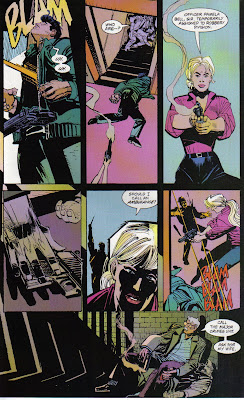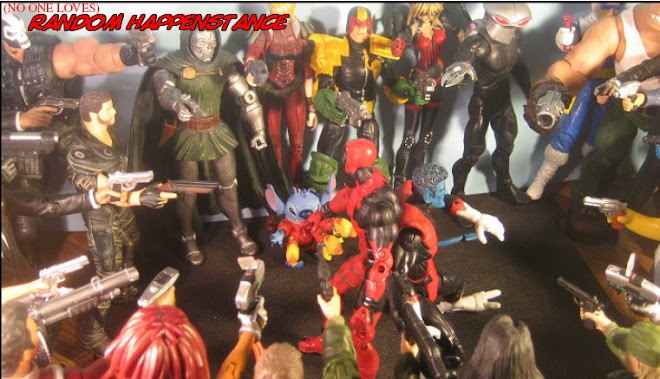Gordon's Law #3 opens with the commissioner's second nightmare of the series, so he hasn't done much yet. Well, compared to Batman or the Punisher or something, I suppose; for a police commissioner he's pretty hands-on. After telling Sarah he's fine but doesn't want her involved, Gordon meets with Thorpe (the dirty F.B.I. agent) and Shotgun Smith (the presumably clean county sheriff). Gordon tasks them to find Junior Manklin, while he checks out the two-nine precinct, which may be involved in the federal reserve robbery.
Thorpe excuses himself to run down some leads, in this case, reporting directly to Manklin. Manklin doesn't buy that Gordon doesn't have more leads, and has to go to his boss for instructions. But first, he's distracted by new face Red Corona chatting up his girl.
Gordon stops by a cop bar near the two-nine, which goes silent as he enters. The son of Gordon's old friend Dougherty, Tim, makes small talk, but then leaves scowling.
Thorpe leads Shotgun into a trap, although they don't kill him yet, wanting to get information on Gordon's investigation first. Gordon calls Sarah and leaves a message, that unless Shotgun has some info for him, he might have to turn the investigation over to the feds, so of course a clue falls in his lap. Wait, clue? More like a hit attempt. In a Manklin Brothers truck. Not subtle, are they? Gordon takes them both out, including one in an explosion. Ducking under the water, he ends up washed out down a storm drain the next issue.
Undercover officer Bell has missed another meeting, and the detectives start to worry. Meanwhile, Junior Manklin seems pretty secure right about now:


Stuff's starting to happen, eh? I was gonna drag this out another day, but let's just wrap it up: a soggy Gordon makes his way back to his office, still in his trench coat. That's commitment. Unfortunately, someone left him a present on his desk: the body of Red Corona, with a note: "This little piggy ran all the way home." Gordon has no idea who he is, another fallen cop. Dejected and exhausted, Gordon calls out for help from a higher power, only to find nothing. No, not God; Batman:

Meanwhile, Shotgun Smith effects a daring, if pretty easy, escape: shoving Tim Dougherty out a window, landing on him, and getting the hell out of there. All while tied up, in a trench coat. Later, Gordon arrives at the scene, and since no one knows he's dirty, the cops are out in full force. Gordon is told Thorpe called in Dougherty's death, calling it a bust gone bad.
Manklin is thrilled at Thorpe's dropping the ball on Smith: Thorpe says he probably died in the fall, but Smith's made his way to his partner's house to lie low. And Gordon has just realized, the dead snitch's last word, "Doc," could have been "Dougherty." Somehow. The senior Dougherty, Pat, plays the grieving father to the officers that visit him; but behind closed doors is furious that Tim was so stupid.
And now we're halfway through the last issue, so things start to pick up: Manklin shows up, with his crew and Thorpe; to tell Dougherty he's tired of taking all the risk of laundering the money while Dougherty can hide behind his badge. Gordon shows up before things escalate, and puts together...a bunch of clues the reader wouldn't have access to.

This is why I've been going through this whole series almost page-by-page, to see if all the clues were there, and they weren't, no. Although, and I was among those that criticized Hush for this; comics have a pretty long-running standard: new friend/mentor/relative/love interest of the hero introduced in a story? They're probably the bad guy. It's a bit Scooby-Do, yeah, but most comics don't usually have the time/page count to establish a real mystery, and even if they did, wouldn't it just confuse most readers? And after four months, who remembers anyway?
Back to the story: the inevitable shootout ensues, and Dougherty and Manklin and his men are gunned down. Gordon's hit, and Thorpe just has to finish him off, collect the cash, and walk away: he's a real Fed, but "I took some vacation time. I kill you, and no one even knows I was here. Just another freak shootout in Gotham." Great plan, Thorpe, except you called in the younger Dougherty's death. Probably not too great of a leap to get to you...
Luckily for Gordon, there's still one player we haven't heard from yet. No, NOT BATMAN.

So officer Bell turns out to have been Manklin's girlfriend. Which brings to mind the terrible, terrible things she probably had to do to get under cover (so to speak) but even though she was only seen in shadows the rest of the series, she was pretty obviously a guy every time, yeah. Dixon and Janson=cheaters! (Although, they were able to avoid any gender-specific pronouns discussing Bell, and that was hard to do just writing this!)
In the end, Smith is due to be released from the hospital, Bullock apologizes to Gordon for not trusting him, and Gordon does the same to Batman. Batman brushes it off, saying he knew Gordon could handle it.
So, on the whole, Gordon's Law probably wasn't worth $7.80 in 1997, but considering I paid a dollar for the series, it's enjoyable enough fluff; and I like Janson's art. (I didn't always: he did a Star Wars Annual when I was a kid that I hated.) If you've ever thought to yourself, damn, I wish Commissioner Gordon would bust some caps, then there you go. I think, and may even have lying around from the same purchase, another Gordon-centric limited, and the one-shot Bullock's Law. None of which were anywhere near as good as Gotham Central, and I hardly have any damn issues of that. Crap.

No comments:
Post a Comment